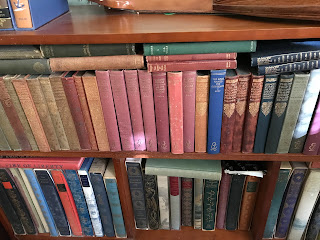I was dusting some books and, as though mysteriously directed, pulled out an old Everyman edition of the Letters of Napoleon bought in a Swansea second hand bookshop some fifty odd years ago.
I turned a random page and was hooked. Is it just me, or does is this small sample make for compulsive reading?
To the Empress (His wife, Josephine)
Warsaw23rd January 1807
I have received your letter of 15 January. I can’t possibly allow a woman to undertake the journey here. The roads are too bad —unsafe, and deep in mud. Go back to Paris; be happy and cheerful and perhaps I will come soon. Your remark that you married a husband to live with him makes me smile. I thought, in my ignorance, that the wife was made for the husband, and the husband for the country, the family, and glory. Forgive my ignorance. There is always something you can learn from the fine ladies of today.
Good-by, my dear. Remember how much it costs me not to let you come. Say to yourself, it shows how much he cares for me.
N
There is so much to unpack in this letter, none of it entirely favourable in today's present climate. What do you get from it?
And if you read this letter, written at the same time, you begin to understand Napoleon’s reasons for discouraging a marital visit.
To Madame Walewska
Warsaw Jan 1807
I saw no one but you, I admired no one but you. I want no one but you. Answer me at once, and assuage the impatient passion of
N
Didn’t you like me, Madame? I had reason to hope you might . . . Or perhaps I was wrong. Whilst my ardour is increasing, yours is slackening its pace. You are ruining my repose! Ah! Grant a few moments’ pleasure and happiness to a poor heart that is only waiting to adore you. Is it so difficult to let me have an answer? You owe me two.
N
There are times — I am passing through one now—when hope is as heavy as despair. What can satisfy the needs of a smitten heart, which longs to throw itself at your feet, but is held back by the weight of serious considerations paralysing its keenest desires? Oh, if only you would!. . . No one but you can remove the obstacles that keep us apart. My friend Duroc will make it quite easy for you.
Ah! Come! Come! You shall have all you ask. Your country will be dearer to me, once you have had pity on my poor heart.
N
Marie, my sweet Marie, my first thought is of you, my desire is to see you again. You will come again, wont you? You promised you would. If you don’t, the eagle will fly to you! I shall see you at dinner—Our friend tells me so. I want you to accept this bouquet; I want it to be a secret link, setting up a private understanding between us in the midst of the surrounding crowd. We shall be able to share our thoughts, though all the world is looking on. When my hand presses my heart, you will know that I am thinking of no one but you, and when you press your bouquet, I shall have you answer back! Love me, my pretty one, and hold your bouquet tight!
N
Maria Walewska
Maria Walewska was the young wife of an elderly Polish noble, and in some lights, she might be seen as a sexual pawn. After the death of her father, Maria’s seven debt-ridden brothers along with their mother faced poverty and ruin. At eighteen, she was persuaded into marriage with the 68-year-old Count Athanasius, Count Colonna-Walewski and all was well, prosperity was restored.
Napoleon
She met Napoleon for the first time in 1806 – a brief encounter during a change of horses at a coaching inn. So impressed was he with her conversation, he engineered a reunion at a Warsaw ball.
History then repeated herself, perhaps more significantly. This time, instead of seven cash-strapped brothers to help out, it was the future of Poland—depending upon who you believe. Certainly, a section of the Polish aristocracy, seeing Napoleon’s growing attraction for her, encouraged Maria to play along. Within weeks she was all but his mistress, was with him at Finckenstein in 1807, Paris in 1808 and 1810, at Vienna in 1809, and she even visited him in his first exile at Elba. The two were blessed with a son, Count Florian Walewski, born May 11th, 1810.
After Napoleon’s exile to St Helena in late 1815, she married her lover Count Philippe Antoine d’Ornano in 1816
and died in 1817 after kidney complications following the birth of their son.
In her memoirs, she sought to put the record straight and thus restore her respectability. Writing about her relationship with Napoleon: ‘The sacrifice was complete. It was all about harvesting fruit now, achieving this one single equivalence (convincing Napoleon to support Polish independence) which could excuse my debased position. This was the thought that possessed me. Ruling over my will it did not allow me to fail under the weight of my bad conscience and sadness.’
Being a romantic, I’m persuaded it was more than that. She wasn't just lying back and thinking of Poland.
Even so, it adds weight to Napoleon’s observation …. ‘Battles against women are the only ones that are won by running away.’
Josephine coming up next week.



_comtesse_Walewska,_puis_comtesse_d'Ornano.jpg)

.jpg)




















